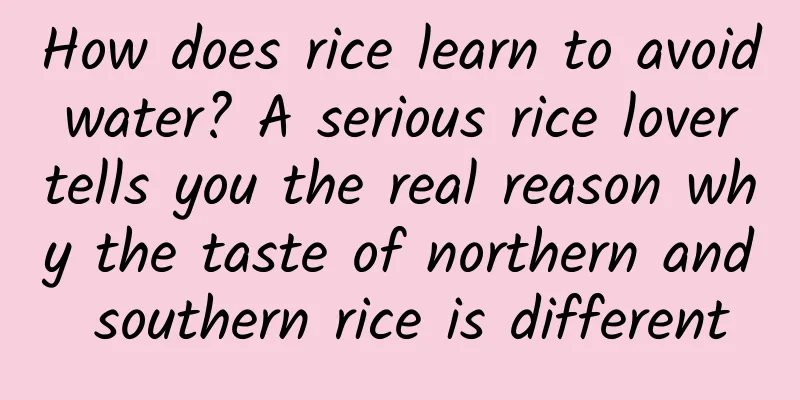How does rice learn to avoid water? A serious rice lover tells you the real reason why the taste of northern and southern rice is different

|
How does rice grown in water breathe? Rice can grow in water because there are many gaps between its roots, stems and leaves, which are called air cavities. These air cavities connect the various parts of rice (leaves, stems and roots), making the whole plant like a straw inserted in the water. Oxygen can reach the roots at the bottom of the water through these air cavities, allowing rice to grow in water. However, this does not mean that rice is not afraid of flooding. When a flood breaks out and the water level exceeds the leaves, the entire plant will be submerged in water and the rice will not be able to breathe. Therefore, when serious waterlogging occurs, drainage must be carried out in time to ensure the normal growth of rice. Why is rice grown on a large scale in the South? The rice planting area in China has been relatively stable, basically maintaining at around 450 million mu, with little change. The rice planting area accounts for about one-third of the total cultivated land in my country. In terms of geographical distribution, the rice planting area in the south is relatively large, while that in the north is relatively small, which is also the so-called "rice in the south and noodles in the north" phenomenon. In addition, the influence of the natural geographical environment has also led to other regional differences, such as "ships in the south and horses in the north", "tea in the south and wine in the north", "oranges in the south and citrons in the north", and "sweet in the south and salty in the north". The main reason why the rice planting area in the south is larger is that the land and climate conditions are more suitable for the growth and development of rice. The climate in the south is warm and humid, with abundant rainfall, and the temperature and humidity are very favorable for the growth of rice. In addition, the eating habits of southern residents are also one of the reasons why the rice planting area in the region is large. Southerners like to eat rice, so rice planting is closely related to the lives of southerners. Why is Northeastern rice so delicious? "Three meals a day, rice is the food", rice, as the staple food, plays a pivotal role in our daily life. In the process of enjoying rice for many years, people have found that Northeast rice is always more delicious than southern rice. There are several reasons for this: First of all, the black soil in Northeast China provides rice with unique advantages. The black soil is famous for its deep soil layer, which can reach a depth of 40 to 80 centimeters. This fertile soil provides rich nutrients for rice, making the rice quality better. Secondly, the climate conditions in Northeast China are very suitable for rice growth. The suitable temperature range for rice growth is 21 to 25 degrees Celsius. The weather conditions in Northeast China happen to meet this requirement. The temperature with a large temperature difference between morning and evening is more suitable for rice growth, and it is also conducive to controlling the temperature difference within the ideal range of 21 to 25 degrees Celsius. In addition, the long sunshine hours in Northeast China provide sufficient sunshine for rice. This temperature condition is very conducive to the growth of rice. Furthermore, the starch structure of rice varies depending on the growing environment. There is a fundamental difference in starch structure between Northeastern rice and southern rice. One of the factors that affect the taste of rice is the content of amylose. When the amylose content in rice is high, the rice tastes sticky; when the amylose content is low, the rice tastes hard and lacks elasticity. The amylose content of Northeastern rice is generally between 20% and 25%, while the amylose content of southern rice is between 15% and 18%. Therefore, when tasting rice, some rice tastes sticky and elastic, while others taste hard. In addition, the taste of early rice is not as good as that of mid-season and late rice because the filling period is too short. The filling period of early rice is in a relatively hot stage in the south, and this high temperature environment may shorten the filling period of early rice. In rice cultivation, this situation is called "high temperature forced ripening". This means that the short filling period of early rice is due to the influence of high temperature. Under high temperature, the filling speed is accelerated, and the organic matter formed by photosynthesis accumulates quickly and irregularly inside the husk, resulting in a more chaotic arrangement of starch molecules. Due to the fast filling speed, the taste of rice is affected. In contrast, the filling period temperature of mid-late rice is relatively low, and the filling speed is relatively slow. In this way, the starch molecules are arranged in an orderly and compact manner in the grains, which is similar to the filling of Northeast japonica rice. Therefore, the taste of mid-late rice is generally better than that of early rice. Produced by: Popular Science in China to Benefit Farmers Scientific Advisor: Tang Zhong, Professor and Doctoral Supervisor, College of Agricultural Engineering, Jiangsu University Co-ordinators: Liao Danfeng, Zheng Fengmao, Wang Changhai, Zhang Ruijie Planning: Wu Yuetong Editor: Lu Jingwen (internship) |
<<: Jellyfish are poisonous, so why are sea cucumbers edible?
>>: What to do if you accidentally lose your phone? It is crucial to do these things!
Recommend
How to make your Tik Tok VLOG become popular content?
Tik Tok is a short video software used by many yo...
Grand Strategy: How do Chinese mobile phones capture the Indian market?
Xiaomi Group's interim financial report shows...
Huke.com C4D software series course video
Huke.com C4D software series course video course ...
2022 Zhou Sicheng Spring Systematic Oral English Season 4
2022 Zhou Sicheng Spring Systematic Oral English ...
Cool effect, Volvo submits patent application for new head-up display
According to foreign media reports, Volvo recentl...
Is the high-priced "baby water" really healthy or a "tax on IQ"? The secret is revealed for you →
Those who have children at home may find that the...
8 suggestions for advertising on Xiaohongshu!
By reviewing the 2021 520 marketing data and refe...
Today in Science and Technology History | 2023·7·17 The first domestically-made large cruise ship successfully completed its maiden voyage
Large cruise ships are known as the "pearl&q...
ZIVOO intends to build the smart home 3.0 era with the help of smart gateway
On July 9 and 10, the Smart Gateway and Smart Hom...
Pest: How can eating expose my ID number? !
Spring has come, and farmers have started their s...
[Case] Ele.me, Meituan, Dianping, and Tmall all have points malls. How do these points work?
Most mature products have their own points system...
Pinduoduo’s live streaming is half a year old: Is it really dead?
In five years, Pinduoduo has increased the number...
Does the record of a total solar eclipse 1,500 years ago contain the shocking secret of the Earth's rotation?
Ancient eclipse records reveal changes in Earth&#...
How much does it cost to rent a 300g defense server in China?
A high-defense server is like putting a layer of ...









